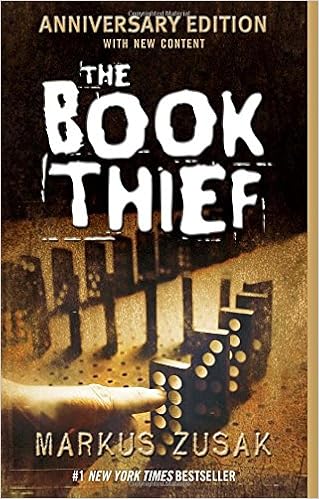I do not think that there can ever be enough books about anything and I say that knowing that some of them are going to be about Pilates.The more knowledge the better seems like a solid rule of thumb, even though I have watched enough science fiction films to accept that humanity’s unchecked pursuit of learning will end with robots taking over the world.-Sarah Vowell
Wednesday, May 25, 2016
The Book Thief by Markus Zusak
For those of you who cry at books, grab the box of Kleenex, you will need every one of them. Zusak uses a very creative choice for his narrator: Death. Set during the time of World War II, the book opens on a train heading for a small town in Germany (where it came from is a mystery). Death has come for Liesel Meminger's little brother and finds himself fascinated in Liesel who, when they bury her brother, steals a book on the ground, likely to remember her brother by, as she cannot read. The book is called The Gravedigger's Handbook. Her mother was taking them to live with a couple, Hans and Rosa Hubermann who live on Himmel Street (which translates as Heaven Street), as she cannot take care of them anymore since her husband, a Communist, "disappeared". Liesel, of course has a hard time getting out of the car to meet her new family or to take a bath.
Both Hans and Rosa love Liesel and show it in different ways. Hans is there in the middle of the night when she has nightmares and plays his accordion for her. He's also the one to teach her to read. Rosa is a tough woman who has an ongoing feud with a neighbor who spucks on their door and yells "Schwiene!" Neither woman seems to know what the original argument was about. At school, Liesel is picked on at first for her ignorance, but the local boy, Rudy Steiner, with the lemon-colored hair and blue eyes, falls for her and becomes her friend, when she blocks a kick, as goalie, in a street game of football [soccer]. The night Jesse Owens won his medals, Rudy, also an athlete, rubbed himself in charcoal, and pretended to be Jesse Owens by running in the streets, which got him into a spot of trouble. He is also always chasing Liesel for a kiss.
Hans makes a living as a painter during the season, but plays his accordion in local bars and such in the winter to make money. Rosa does washing and ironing to bring in money. Liesel takes the laundry to and from the houses and gives a detailed response to how the clients reacted. One of them, Ilsa Hermann, the wife of the Mayor of Molching, is one of Rosa's clients. Ilsa is beyond depressed over the death of her son in the previous war and she has a beautiful library, that she ends up letting Liesel use. As their relationship, a rocky one at first, as Liesel does not know what to make of her, grows and blooms like a flower, Ilsa comes out of herself and Liesel enters the world of books. Ilsa gives her a journal to write in. It is Ilsa's husband that has the book burning where Liesel is forced to toss in a book given to her, but later after everyone has gone, she steals a hot book from the pile to take with her.
Max Vanerburg comes to stay with the Hubermann's because as a Jew, he is in danger. Max's dad and Hans served together in World War I (where Hans gave death the slip, but he got Max's dad). While he is there, he helps with Liesel's reading and he even takes a copy of Mein Kemp and paints the pages white and writes her two books. When the Nazis come to do an inspection, they somehow hide him from them and are told that they need to make improvements to their basements as it does not meet their standards.
I could go all English minor on you and talk about the themes of Death, Love, and Reading, and how important colors play a role, but I won't. Death says it is "haunted by humans" and maybe that is perhaps because of how we can go from love to hate on a dime. Liesel is special to him, because she is different. Having Death as the narrator means you get to find out when and why someone dies, which you may, or may not, like. The author also includes, what I enjoyed but others may not, some very interesting definitions intermittently throughout the book. Zusak wrote the book because he felt it was important to know that not every German was a Nazi. Not every German was an evil person. Some were sweet kids with lemon-colored hair who had no interest in Hitler and loved Jesse Owens. Some hid Jews in their basements. A lot of them just lived their lives. If you've read my book review on Ravensbruck, then you've heard me talk about people being various shades of gray, not black and white. Which makes books like this so important to remind us of our humanity.
Link to my Ravensbruck Review: http://nicolewbrown.blogspot.com/2016/01/ravensbruck-life-and-death-in-hitlers.html
Link to Amazon: http://ecx.images-amazon.com/images/I/51LK1NgAk6L._SX317_BO1,204,203,200_.jpg
Subscribe to:
Post Comments (Atom)


No comments:
Post a Comment